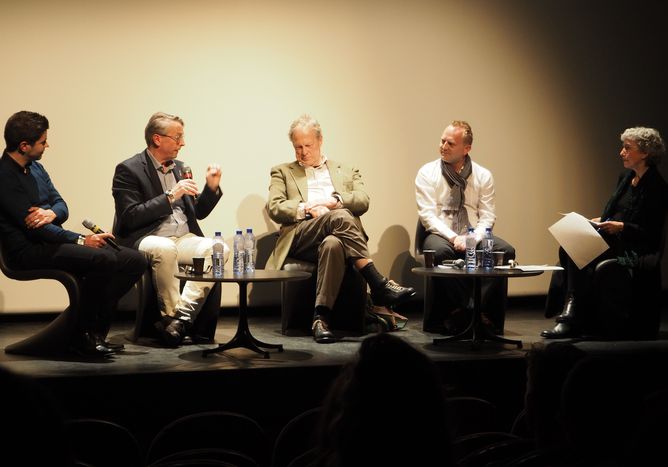
Whistleblowing: the second wind of an old act
Published on
“Whistleblowers” have become increasingly important players in the field of investigative journalism. Earlier this month, a panel of journalists at a Press Freedom Day event in Brussels discussed the growing influence of this act in the digital age.
Whistleblowing and investigative journalism were just two of the interlinked themes last week in an event entitled The Difference Day. The event was held at BOZAR, the Centre for Fine Arts in Brussels, as a part of International World Press Freedom Day. In the event, a panel of experienced journalists addressed the question of whether investigative reporting can save the world – or advance transparency of state or corporate operations.
“Ten years ago, I would have said that the aim of investigative journalism is to help people understand the world they live in. But now I think, in 2015 the objective must be to change the world”, said Alain Lallemand, from Le Soir. A whistleblower is a term that refers to a person who decides to "blow the whistle", to pause the game and leak information inside his or her own organisation in order to expose misconduct or corruption.
While there have been famous whistleblowers in the past, from Mark Felt, aka Deep Throat who brought forth the Watergate scandal that helped bring down US President Richard Nixon, to Daniel Ellsberg, who leaked the Pentagon Papers about the USA's involvement in Vietnam, recently, the act has become far more central to investigative journalism.
“Whistleblowing as a phenomenon is new. It has changed our work, and the nature of the investigative process”, suggests Gavin MacFayden, the director of Centre of Investigative Journalism in London. MacFayden has worked in close contact with WikiLeaks and gives credit to Julian Assange as the gate-opener for the second wind of this phenomenon.
Blowing the whistle with Snowden
Lars Bové, from Belgian newspaper De Tijd, said that whistleblowers played a decisive role in LuxLeaks, the recent international investigation into tax avoidance schemes in Luxembourg and elsewhere. “To be honest, I have to say that we, as journalists, don’t always choose the issues we start to investigate. Some of the big stories recently have been possible due to these whistleblowers. Otherwise there might not be any data to investigate,” admitted Bové.
 One of the best-known whistleblowers is of course Edward Snowden, the American IT professional who in 2013 exposed documents about how surveillance by the authorities in the United States extends into wide collection of data about citizens’ phone calls and e-mails. 'The Difference Day' audience was shown the Oscar-winning film Citizenfour by Laura Poitras about Snowden and the journalists who worked on the surveillance revelations. Snowden himself has been reported in The Guardian to have been “extremely reluctant” about the idea of filming the meetings at first. Yet in the film, Snowden appears surprisingly calm, even if very cautious. Acting as a whistleblower is stressful.
One of the best-known whistleblowers is of course Edward Snowden, the American IT professional who in 2013 exposed documents about how surveillance by the authorities in the United States extends into wide collection of data about citizens’ phone calls and e-mails. 'The Difference Day' audience was shown the Oscar-winning film Citizenfour by Laura Poitras about Snowden and the journalists who worked on the surveillance revelations. Snowden himself has been reported in The Guardian to have been “extremely reluctant” about the idea of filming the meetings at first. Yet in the film, Snowden appears surprisingly calm, even if very cautious. Acting as a whistleblower is stressful.
This was confirmed by Gavin MacFayden, who has been involved in protecting whistleblowers. He told the audience how he was surprised in the beginning by the fact that the first kind of help that whistleblowers asked for, was psychological help. The need for legal advice came only after that.
New technology helps
New technology is playing a decisive role in whistleblowing and investigative journalism. For example, the WikiLeaks project has developed software and encryption methods that can protect the leakers, but, also, the more everyday technological aspects may help a journalist's investigation. Kristof Clerix, from Belgian international affairs magazine MO*, mentioned that journalists have been able to get valuable information through methodical and long-term following of Twitter or Facebook, or through crowdsourcing valuable information, such as eyewitness material, via social media. “And there are all these amazing sources such as open databases, that we now have. With data processing and a simple excel file, journalists can already do a lot”, encouraged Clerix.
In a self-critical manner, the panel also discussed some of the obstacles of investigative reporting: big egos or media competition may get in the way of co-operation that is necessary for certain large issues. However, it's clear that associations such as the International Consortium of Investigative Journalists have enhanced the possibilities of working together.



